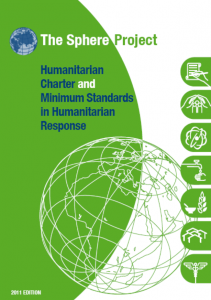This second volume of the Water Under Fire report series is dedicated to the WASH sector’s capacity to deliver a predictable, quality humanitarian WASH response, and provides a change agenda and road map towards strengthening this capacity.
Archives
Water Under Fire (Vol 2)

WASH in the Comprehensive Refugee Response Framework (UNHCR, 2019)

This document describes the objectives and underlying principles of WASH programming in the UNHCR Comprehensive Refugee Response Framework, including steps to be taken, and the role of UNHCR. Guidance is provided for all phases of the relief cycle from preparedness to long-term inclusion.
- Tags: Humanitarian to Development, Humanitarian to Development, and Urban.
WASH Nutrition

A practical guidebook on increasing nutritional impact through integration of WASH and Nutrition programmes. It is meant for practitioners in humanitarian and development contexts.
- Locations: Africa, Asia and the Pacific, Central Asia, Europe, Middle East, and South-West Asia. Organisations: ACF, UNICEF, and UNICEF.
UNHCR WASH MANUAL: Programme Guidance

The UNHCR WASH Manual: Programme Guidance, provides practical guidance for WASH programmes in refugee settings.
- Tags: camp management, CASH Interventions, Child Friendly Facilities, Child Friendly Facilities, Cold Climates, and WASH Reporting. Categories: WASH Manual.
F-105/2015a Site Level Refugee WASH Operational Plan Template (UNHCR, 2015)

This template can be used to help UNHCR and WASH actors establish a simple WASH operational plan (WHO will do WHAT, WHERE, WHEN, and HOW and WHO will PAY and WHO will MONITOR). This template can be used in addition to the site level WASH Strategy Template.
Sphere Minimum Standards and Indicators for Humanitarian Response (SPHERE PROJECT, 2011)

The Sphere Handbook is one of the most widely known and internationally recognized sets of common principles and universal minimum standards for the delivery of quality humanitarian response.
- Tags: Bathing Facilities, Communal Toilets, Disability, Disability, Drainage, Grey Water Disposal, Handwashing with Soap, Household Water Treatment, Laundering Facilities, Menstruation Hygiene Management, Piped Water Networks, WASH Assessments, WASH Assessments, WASH Assessments, WASH Assessments, Water Quality Testing and Surveillance, and Water Safety Plans. Organisations: SPHERE.
UNHCR Global Strategy for Public Health 2014 – 2018 (UNHCR, 2014)

This document describes UNHCR’s global strategy for public health through a set of guiding principles and strategic approaches including protection; age, gender and diversity; equity; access; sustainability; community empowerment; appropriateness and reliability; partnerships and coordination; capacity building; communication and advocacy; integrated approaches; measurement and monitoring; and innovation. The document describes strategic objectives and enabling actions per sub-sector (Public Health, HIV and Reproductive Health, Food Security and Nutrition, and WASH).
- Tags: Disease Vector Control, Disease Vector Control, Gender, Gender, Gender, Gender Based Violence, Gender Based Violence, Gender Based Violence, Human Right to Water / Sanitation, Human Right to Water / Sanitation, Human Right to Water / Sanitation, Human Right to Water / Sanitation, Human Right to Water / Sanitation, Human Right to Water / Sanitation, Hygiene Promotion, Hygiene Promotion, Hygiene Promotion, Protection, Protection, Protection, Protection, Protection, Public Health, Public Health, Value for Money, and Value for Money.
F-104/2015a UNHCR Site Level Refugee WASH Strategy Template (UNHCR, 2015)

Where required, UNHCR and WASH actors should work together to develop a site level refugee WASH strategy document that clearly describes the refugee context, the baseline WASH situation, WASH coverage, WASH gaps, along with short (6 months), medium (6 months – 5 years) and long-term (>5 years) strategies for each of the WASH sub-sectors and the twelve (12) WASH principles. This template can be used to help produce the site level WASH Strategy.
F-102/2015a UNHCR WASH Organisational Capacity Assessment (UNHCR, 2015)

This tool has been designed to help obtain a snapshot capacity of national public, private, or refugee-based WASH service providers and understand the type of interventions that can be carried out to build capacity.
- Tags: Capacity Building, Capacity Building, Capacity Building, Capacity Building, and Capacity Building. Categories: WASH Blank Forms, WASH Blank Forms, and WASH Blank Forms.
UNHCR WASH Guidelines on Camps Closure (UNHCR, 2015)

This brief is intended to highlight key WASH elements for camps closure. It focuses on specific actions, including the highlights of public health risks associated with health, water, sanitation, and hygiene (WASH) when dealing with decommissioning of WASH infrastructures. The overall closure implementation actions and modus operandi should be context specific and properly planned in coordination with key stakeholders.
- Tags: Camp Closure, Camp Closure, Cross Cutting, Cross Cutting, Cross Cutting, Cross Cutting, Cross Cutting, Cross Cutting, Cross Cutting, Cross Cutting, Environment, Environment, Environment, Excreta Management, Excreta Management, Excreta Management, Excreta Management, Solid Waste Management, Solid Waste Management, WASH Programme Health and Safety, WASH Programme Health and Safety, WASH Programme Health and Safety, WASH Programme Management, WASH Programme Management, WASH Programme Management, WASH Programme Management, WASH Programme Management, WASH Programme Management, WASH Programme Management, WASH Strategy Development, WASH Strategy Development, WASH Strategy Development, WASH Strategy Development, WASH Strategy Development, WASH Strategy Development, WASH Strategy Development, WASH Strategy Development, Water Supply, Water Supply, Water Supply, and Water Supply. Languages: English, English, English, English, English, English, English, English, English, and English. Organisations: UNHCR, UNHCR, UNHCR, UNHCR, UNHCR, UNHCR, and UNHCR. Categories: WASH Guidelines, WASH Guidelines, WASH Operational Guidelines, WASH Operational Guidelines, WASH Operational Guidelines, WASH Operational Guidelines, WASH Operational Guidelines, WASH Policy Guidelines, WASH Policy Guidelines, WASH Policy Guidelines, WASH Policy Guidelines, WASH Policy Guidelines, WASH Policy Guidelines, WASH Reference Documents, WASH Reference Documents, WASH Reference Documents, WASH Reference Documents, WASH Reference Documents, WASH Reference Documents, WASH Reference Documents, WASH Reference Documents, WASH Reference Documents, and WASH Reference Documents.
